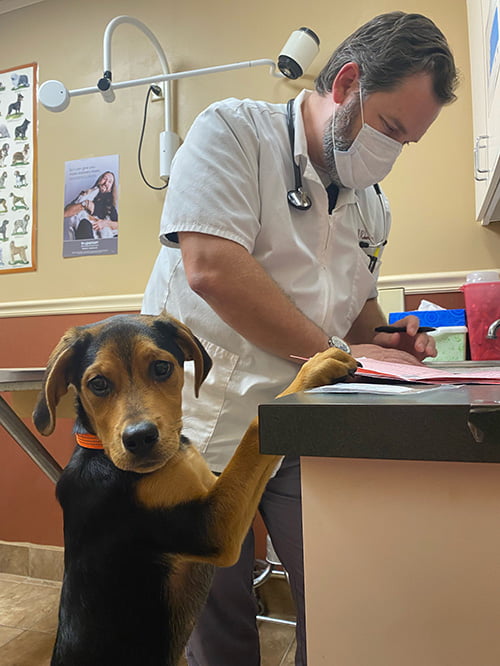We provide your pet with the expert care they need.
Booking your appointment has never been easier
Vaccinations are an important part of routine veterinary care to help protect pets from serious sickness and disease. Wolftever wants to partner with you from the early stages of your pet’s life and offers pet vaccines in Chattanooga, TN. Puppies and kittens generally require a series of shots at each of their wellness visits. These shots are essential for keeping your furry friends healthy and well, which can help them thrive throughout their lives.
Like people, pets are vulnerable to certain viruses and other germs they can catch from other animals or may encounter just from going outside. Many of these diseases can make pets very sick. Some, such as rabies, can be deadly – and can even be passed to people if an infected animal bites someone. The good news is, we have vaccines that can protect your pet from these diseases.

The exact regimen of vaccines a pet should get varies, depending on the type of pet you have, whether your pet goes outdoors, what diseases are common in your area, and other factors. Our veterinarians can share the timeline for vaccines with you. Recommended vaccines are:
Testing and pet vaccines in Chattanooga are strongly recommended for feline leukemia, as well, especially for cats who go outdoors. This is a very contagious virus, easily spread among cats. Cats that go outdoors are at greater risk of exposure. New cats or kittens can bring the virus into your household, so it’s important to screen for it even if your pet will remain indoors, especially if you have other cats.
Your cat may also encounter parasites or other germs from eating birds and rodents or digging in dirt. If your cat goes outside, talk to your vet about preventives for these illnesses, too. Yearly fecal testing can screen for internal parasites and other diseases, so you can treat any infections that may occur.
Dogs should get immunization against:
Additionally, it’s often advisable to vaccinate against kennel cough, a very contagious infection dogs can catch from other dogs when they go to the groomer, a dog park, a “doggie daycare” center, or other community environments. Canine influenza is another concern your vet may recommend vaccination for.
Some vaccines are recommended for all pets. Others are specifically for outdoor pets. One example is feline leukemia. This virus is easily transmitted among cats. Kittens should be tested for exposure. If tests are negative, and the cat will stay inside, it might not be necessary to vaccinate against the disease. However, it’s very common for kittens to stay inside and older cats to venture outdoors. So, it often makes sense to adjust your approach to managing the risk for feline leukemia, such as through vaccination, as your pet gets older. Call for more info about our pet vaccines in Chattanooga, TN.


Booking your appointment has never been easier